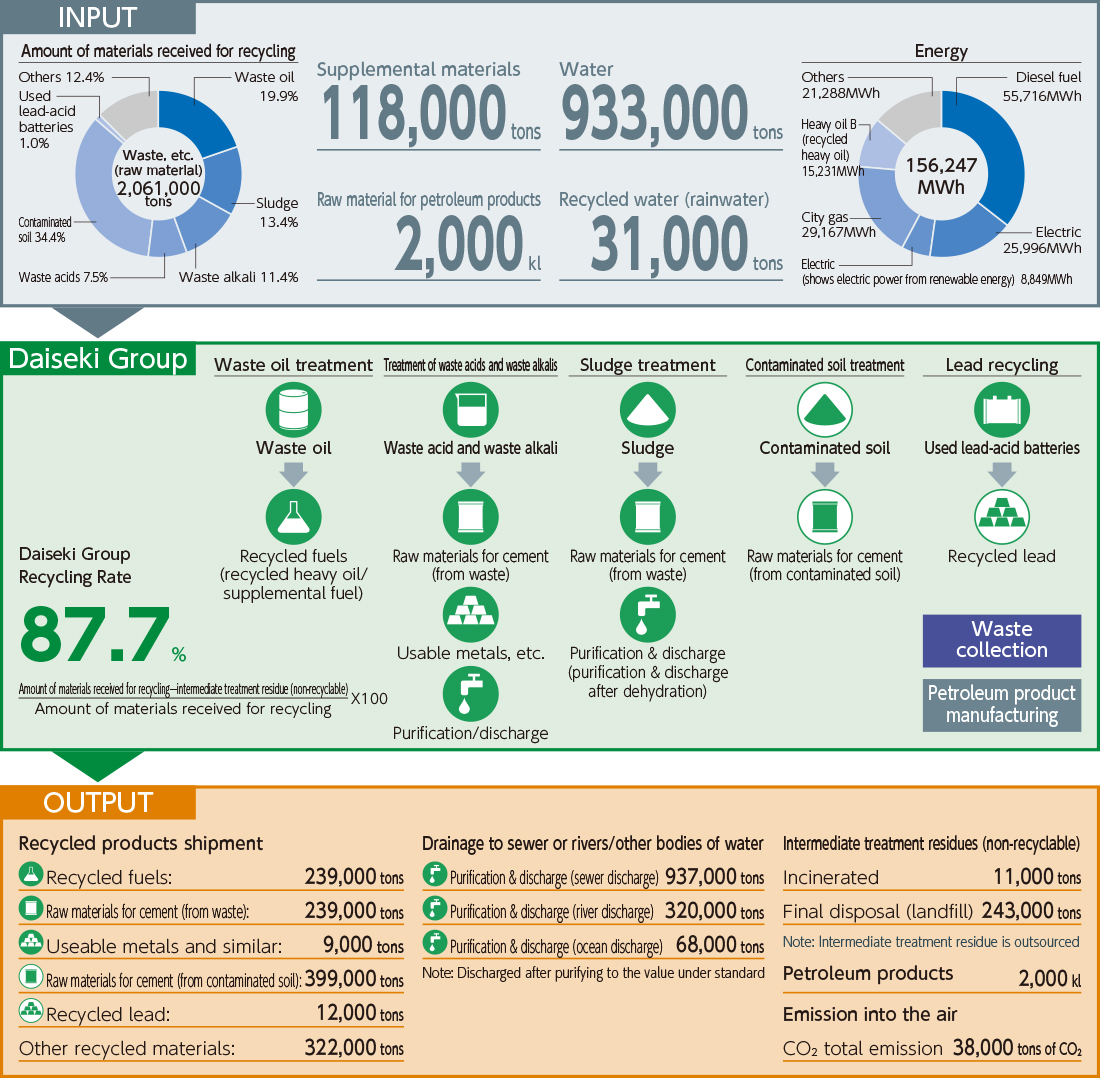Initiatives for environmental conservation
Overall picture of the environmental impacts of our business activities
Perspective of the environmental load by Daiseki Group’s recycling business

Scope of data coverage: Daiseki and Group companies
Period of data coverage: March 2024 to February 2025
Appropriate treatment of waste
While we recycle the wastes that we accept from our customers, we outsource a portion of wastes that we are unable to recycle to waste disposal service providers that perform landfill or incineration. Managers in charge of waste emissions at our business sites outsource the disposal only to such waste disposal providers that comply with the contractor selection criteria stipulated in our Waste Management Regulations. We further conduct regular on-site inspections of the waste disposal providers to judge their continued eligibility as contractors.
Detoxification of toxic waste
Special control industrial waste is defined as highly hazardous under the Waste Management and Cleaning Law. It is waste that has a negative impact on the natural environment, even in minute quantities. The Daiseki Group accepts special control industrial waste that contains harmful substances such as strong acids, strong alkalis, and heavy metals, and appropriately renders the harmful substances harmless by adding chemical agents, etc. For the residues, etc., remaining after the appropriate treatment, we outsource the disposal to an external waste disposal company as special control industrial waste in accordance with legal standards. Through the appropriate treatment of hazardous waste in this way, the Daiseki Group is contributing to the conservation of the natural environment.
ESG Data: Volumes of special control industrial waste received and discharged
Reduction in water consumption
We are striving to reduce the use of water resources such as drinking water, industrial water, and groundwater in our business activities. Water resources are mainly used for washing vehicles that collect and transport industrial waste, and water resource usage is reduced by reusing rainwater and other water resources.
ESG Data: Water resource usage
Prevention of air pollution
In accordance with the Air Pollution Control Act, we perform annual measurements of air pollutants emitted from all our soot- and smoke-emitting equipment, such as small boilers, and maintain the values within the required criteria. We also install dust collectors, humidification equipment, and other equipment in plants to prevent the generation of dust from industrial waste treatment.
Measures against unpleasant odors
Daiseki takes steps to counter unpleasant odors from the waste we receive by analyzing samples of that waste before it is delivered to us and, in cases where it generates significant unpleasant odor, determining in advance whether to accept its delivery and the treatment methods to be used. We are working to prevent odors within our plants by eliminating odor of exhaust gas with a deodorizing device .
Controlling water quality of drainage water
Daily management of wastewater is not just limited to water quality standards set by law , such as the stabilization of wastewater facilities, the maintenance and strengthening of control processes, and emergency response training. It also includes individual agreements with municipalities and the establishment of voluntary standards at each site to guarantee rigorous management of wastewater.
Prevention of off-site leaks
We install raised dikes around storage tanks and oil-water separation tanks in plants to prepare for unlikely incidents of wastewater or waste oil spill to prevent the liquid to enter rivers, soil, groundwater, or outside of our sites.
Proper storage and treatment of PCB waste
The low flammability and excellent electrical insulating properties of polychlorinated biphenyls (PCBs) have led to their wide use as insulating oils in electrical equipment. However, their manufacture and import are currently prohibited due to their high toxicity. We do not own equipment that contains PCBs.
Moreover, we do not handle PCBs and when we receive industrial wastes for disposal we confirm that they do not contain PCBs.
Compliance with laws and regulations related to the environment
In addition to complying with the environmental laws, ordinances, and other regulations, we have also established our own management standards to ensure thorough management. To comply with revisions to environment-related laws and regulations such as the Energy Conservation Act*1 and the Global Warming Countermeasures Act*2, the Chemical Substance Management Act*3, the Chemical Substance Evaluation Act*4, the Waste Management and Cleaning Law*5, and the Soil Contamination Countermeasures Act, we collect information provided by government bodies, industry associations, and other parties, and promote awareness and enforcement in relevant departments.
*1 Common name for "Act on the Rational Use of Energy
*2 Common name for "Act on Promotion of Global Warming Countermeasures"
*3 Common name for "Act on the Assessment of Releases of Specified Chemical Substances in the Environment and the Promotion of Management Improvement"
*4 Common name for "Act on the Regulation of Manufacture and Evaluation of Chemical Substances"
*5 Common name for ”Waste Management and Public Cleansing Act"









